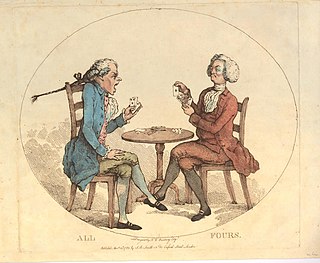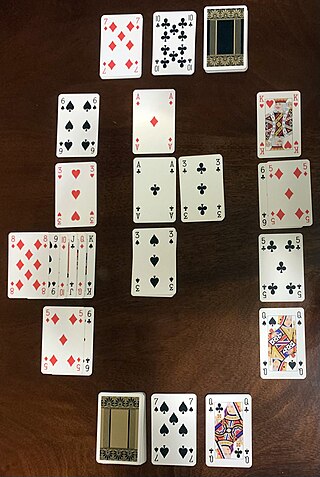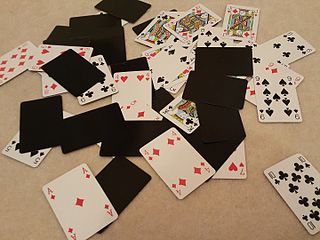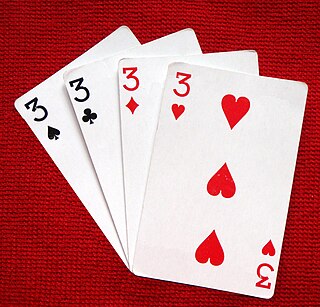Related Research Articles

Blackjack is a casino banking game. It is the most widely played casino banking game in the world. It uses decks of 52 cards and descends from a global family of casino banking games known as "twenty-one". This family of card games also includes the European games vingt-et-un and pontoon, and the Russian game Ochko. The game is a comparing card game where players compete against the dealer, rather than each other.

Oh hell or contract whist is a trick-taking card game of British origin in which the object is to take exactly the number of tricks bid. It was first described by B. C. Westall around 1930 and originally called oh! well. It was said to have been introduced into America via the New York clubs in 1931. Phillips and Westall describe it as "one of the best round games".

Games of patience, or (card) solitaires as they are usually called in North America, have their own 'language' of specialised terms such as "building down", "packing", "foundations", "talon" and "tableau". Once learnt they are helpful in describing, succinctly and accurately, how the games are played. Patience games are usually for a single player, although a small number have been designed for two and, in rare cases, three or even four players. They are games of skill or chance or a combination of the two. There are three classes of patience grouped by object.

All fours is a traditional English card game, once popular in pubs and taverns as well as among the gentry, that flourished as a gambling game until the end of the 19th century. It is a trick-taking card game that was originally designed for two players, but developed variants for more players. According to Charles Cotton, the game originated in Kent, but spread to the whole of England and eventually abroad. It is the eponymous and earliest recorded game of a family that flourished most in 19th century North America and whose progeny include pitch, pedro and cinch, games that even competed with poker and euchre. Nowadays the original game is especially popular in Trinidad and Tobago, but regional variants have also survived in England. The game's "great mark of distinction" is that it gave the name 'jack' to the card previously known as the knave.

Euchre or eucre is a trick-taking card game commonly played in Australia, Canada, Great Britain, New Zealand, and the Midwestern United States. It is played with a deck of 24, 25, 28, or 32 standard playing cards. There are normally four players, two on each team, although there are variations for two to nine players.

Crazy Eights is a shedding-type card game for two to seven players and the best known American member of the Eights Group which also includes Pig and Spoons. The object of the game is to be the first player to discard all of their cards. The game is similar to Switch, Mau Mau or Whot!.

Pit is a fast-paced card game for three to eight players, designed to simulate open outcry bidding for commodities. The game first went on sale in 1904 by the American games company Parker Brothers, having been developed by the attributed clairvoyant Edgar Cayce.

Brag is an 18th century British card game, and the British national representative of the vying or "bluffing" family of gambling games. It is a descendant of the Elizabethan game of Primero and one of the several ancestors to poker, the modern version just varying in betting style and hand rankings. It has been described as the "longest-standing British representative of the Poker family."

Thirty-one or Trente et un is a gambling card game played by two to seven people, where players attempt to assemble a hand which totals 31. Such a goal has formed the whole or part of various games like Commerce, Cribbage, Trentuno, and Wit and Reason since the 15th century. 31 is popular in America and Britain.

Russian bank, crapette or tunj, historically also called the wrangle, is a card game for two players from the patience family. It is played with two decks of 52 standard playing cards. The U.S. Playing Card Company, who first published its rules in 1898, called it "probably the best game for two players ever invented".

52 pickup or 52-card pickup is a humorous prank which consists only of picking up a scattered deck of playing cards. It is typically played as a practical joke, where the "dealer" creates the false impression that a legitimate game will be played, then simply throws the entire deck into the air so the cards land strewn on the floor and instructs other players to pick them up.

Twenty-five is the Irish national card game, which also underlies the Canadian game of Forty-fives. Charles Cotton describes its ancestor in 1674 as "Five Cards", and gives the nickname five fingers to the Five of Trumps extracted from the fact that the Irish word cúig means both 'five' and 'trick'. It is supposed to be of great antiquity, and widely believed to have originated in Ireland, although "its venerable ancestor", Maw, of which James I of England was very fond, is a Scottish game.

Napoleon or Nap is a straightforward trick-taking game in which players receive five cards each and whoever bids the highest number of tricks chooses trumps and tries to win at least that number of tricks. It is often described as a simplified version of Euchre, although David Parlett believes it is more like "an elaboration of Rams". It has many variations throughout Northern Europe, such as Fipsen. The game has been popular in England for many years, and has given the language a slang expression, "to go nap", meaning to take five of anything. It may be less popular now than it was, but it is still played in some parts of southern England and in Strathclyde. Despite its title and allusions, it is not recorded before the last third of the nineteenth century, and may have been first named after Napoleon III.
Double Solitaire is a two-player variant on the best-known patience or solitaire card game called Klondike. While it is mostly referred to as Double Solitaire, it is sometimes called Double Klondike. Games with more players are also possible.

Put, occasionally Putt, is an English tavern game first recorded in the 16th century and later castigated by 17th century moralists as one of ill repute. It belongs to a very ancient family of trick-taking card games and bears close similarities a group known as Truc, Trut,Truque, also Tru, and the South American game Truco. Its more elaborate cousin is the Catelan and Spanish game of Truc, which is still much played in many parts of Southern France and Spain.

Rams is a European trick-taking card game related to Nap and Loo, and may be played by any number of persons not exceeding nine, although five or seven make a good game. In Belgium and France, the game of Rams is also spelt Rammes or Rems, in Germany, Rams, Rammes, Ramsch, Ramschen, Ramscheln or Ramsen, in Austria, Ramsen and Ramschen, and, in America, Rounce. The basic idea is fairly constant, but scoring systems vary. It was a widespread European gambling and drinking game that is still popular today. During the 19th century, it was introduced as Rounce in America and played with a 52-card deck without any difference between simples and doubles and with no General Rounce announcement. In the modern German variety of the game, Ramscheln, the 7♦ is the second best trump ranking next below the ace.

The following is a glossary of terms used in card games. Besides the terms listed here, there are thousands of common and uncommon slang terms. Terms in this glossary should not be game-specific, but apply to a wide range of card games played with non-proprietary packs. It should not include terms solely related to casino or banking games. For glossaries that relate primarily to one game or family of similar games, see Game-specific glossaries.

Tarot games are card games played with tarot packs designed for card play and which have a permanent trump suit alongside the usual four card suits. The games and packs which English-speakers call by the French name tarot are called tarocchi in the original Italian, Tarock in German and similar words in other languages.

The Fool is one of the 78 cards in a tarot deck. Traditionally, it is the lowest of the 22 trump cards, in tarot card reading called the 22 Major Arcana. However, in tarot card games it developed to be not one of the trump cards but a special card, serving a unique purpose by itself. In later Central European tarot card games, it re-developed to now become the highest trump. As a consequence and with respect to his unique history, The Fool is usually an unnumbered card with a unique design; but sometimes it is numbered as 0 or more rarely XXII. Design and numbering-or-not to not clearly indicate its role as a trump or special card in the specific game.

My ship sails, also called my bird sings, is an English card game for children that is played with a 52-card French-suited pack in which the aim is to collect a hand of cards in one suit.
References
- 1 2 Sheila Anne Barry (1987). The World's Best Party Games. p. 14. ISBN 0-8069-6484-7.
- 1 2 Joseph Leeming (1980). Games and Fun with Playing Cards. p. 120. ISBN 0-486-23977-2.